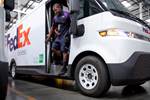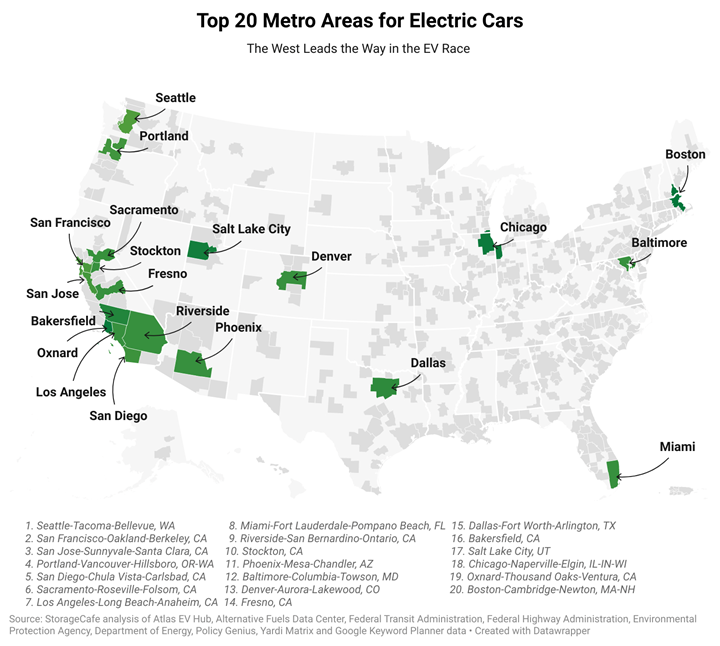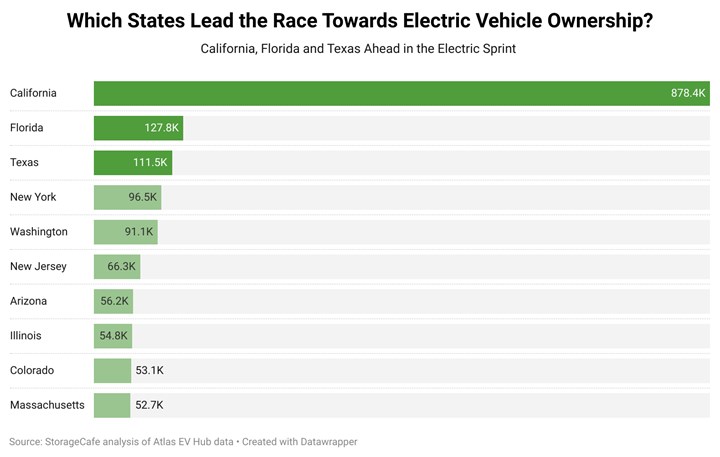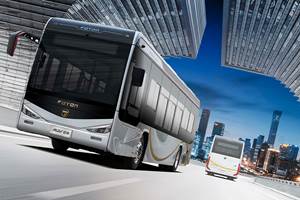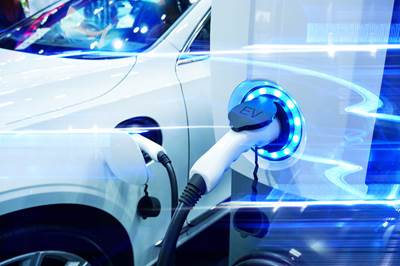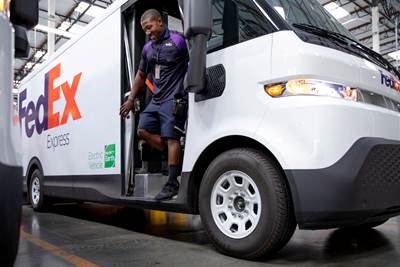Electric vehicle analysis ranks most-ready hubs for EV adoption
StorageCafe examines 100+ U.S. metropolitan areas and ranks the top 10 by number of EVs, public chargers, electricity cost, infrastructure challenges, clean energy, EV insurance costs, local incentives and more.
The top 20 metro areas for electric vehicles (EVs), as reported by StorageCafe. Photo Credit, all images: StorageCafe
The electric revolution continues its march, with the last couple of years being a new landmark for growth, StorageCafe reports. Electric vehicle (EV) sales reached 800K in 2022, a 65% increase compared to 2021. Tesla is still the market leader, but competition is revving up, with household names in the car industry, such as Ford and Mercedes, aiming to carve a slice out of the EV market alongside recent newcomers such as Rivian, Lucid and Fisker. Moreover, the market seems to be diversifying, with more buses and trucks joining the ranks of EVs. Bolstered by federal incentives, more than 5,000 electric buses were in operation in 2022 nationwide, a 66% increase compared to 2021.
Electric cars come with a promise of environmental friendliness, but the electric movement is not without its challenges. Major hurdles in mainstream adoption have been the high price of owning an EV as well as range and charging options. However, as the industry scales, they are more likely to become more affordable. In fact, they’re expected to reach price parity with conventional vehicles in 2023. Additionally, tax incentives signed into law in 2022 are making buying an EV a much more likely prospect for those on average incomes. The charging network is also quickly expanding, with nationwide charging stations increasing by 58% in 2021 compared to 2020, per the U.S. Department of Energy’s (DOE’s) Alternative Fuels Data Center.
As the electric race heats up, some places turn out to be better than others in fostering electric vehicle adoption. To see which places offer optimal conditions for EV uptake, StorageCafe has analyzed the largest metropolitan areas in the country with a population of more than 500K (113 metro areas).
Each area was ranked against a series of metrics including number of EVs, public chargers, price of electricity (expressed as an eGallon), a dedicated highway system (HOV and HOT lanes), condition of roads, clean energy, EV insurance costs and local incentives. Additionally, as EV drivers tend be multicar owners, local self storage provision has also been considered, as this can help with parking and garage space optimization.
According to StorageCafe’s research, the West dominates the list of the best places for EVs. In line with their broader sustainability and smart growth goals, western hubs have amplified efforts toward expanding and improving the infrastructure and market conditions so as to support EV uptake at a larger scale. Seattle has made great strides, as have San Francisco, San Jose and Portland, to create a favorable context for people to embrace electric driving.
Perhaps unsurprisingly, given the state’s commitment to environmentally friendly policies, California claims more than half of the spots in the top 10. EVs have become a permanent fixture of California’s roads, and the trend is set to continue. In the first part of 2022, 16% of California vehicle sales were electric, much above national figures for EVs, which made up about 6% of total car sales.
Moreover, the Los Angeles metro area boasts the largest number of EVs, roughly 293K, as well as the highest number of charging stations — now inching close to 4,800. San Francisco also fares well with 105K electric cars, the third-best EV presence across the 100 largest metros.
Overall, EV ownership in California increased 27% in 2021 compared to 2020 and now counts over 878K electric vehicles.
Other major hubs are working hard to catch up with California metro areas in terms of EV ownership, with the New York metro area boasting 112K EVs, second only to L.A. The Washington (40K) and Chicago (39K) metro areas also count an impressive number of electric cars. Moreover, you can find about 38K EVs in the Phoenix metro area. Overall, there are more than 2.2 million EVs cruising the nation’s streets.
StorageCafe provides a more in-depth look at what made the 10 best metro areas shine in terms of EV friendliness, which can be viewed at this link. Key takeaways include:
- Seattle, Washington, is the best metro area for EVs due to a combination of factors including the high number of EVs, charging options and clean energy production.
- The West dominates the electric landscape, with nine western hubs landing in the top 10 best places for EVs.
- Miami, Florida, is the only southern metro area to crack the top 10.
- By the numbers alone, L.A. has the most EVs and the largest number of public charging stations among the 100 largest metro areas.
StorageCafe also studies developing infrastructure and how the largest metro areas stack up in terms of EV readiness, and provides a report that seeks to identify the best places for EVs. Interviews from a variety of experts cover common questions and concerns still surrounding EVs, and their take on the rapidly growing industry. All of this information can also be viewed here.
Learn more about composites use in EVs.
Related Content
Composites end markets: Automotive (2025)
Composites manufacturing intelligence drives circular economy solutions as automotive industry balances technical demands with sustainability mandates.
Read MoreMoving toward sustainable automotive parts manufacturing
How can the automotive supply chain prepare for future sustainability requirements? Tier 1 Kautex Textron discusses emissions reduction, design for circularity and transition to recycled/bio-based plastics.
Read MoreElectromagnetically transparent GFRP rotor for rare earth magnet-free electric motors
A research consortium within the Baden-Württemberg’s ICM research cluster has created a prototype GFRP wireless power transfer electric motor rotor.
Read MoreExel Composites supplies fiberglass profiles for Foton electric buses
Partnership with Chinese automotive manufacturer will see the implementation of pultruded profiles in various bus models, backed by weight savings, complex geometries and long life.
Read MoreRead Next
Opportunities and challenges for composites in electric vehicles
Polymer and material specialists at chemical consulting firm ChemBizR reflect on the role of composites in current and future efforts to make electric vehicles more efficient — and more attractive for consumers.
Read MoreComposite tension leaf springs: Available for trucks at last
Tension leaf springs with progressive spring rates meet the demanding needs of truck suspensions.
Read MoreRobotic computed laminography brings X-ray CT resolution to large composite structures
Omni NDE collaborative robots, X-ray end effectors and Voxray’s reconstruction approach enables 5-micron inspection of aerospace parts without size constraints.
Read More


